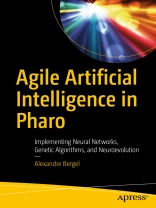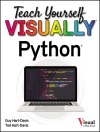Cover classical algorithms commonly used as artificial intelligence techniques and program agile artificial intelligence applications using Pharo. This book takes a practical approach by presenting the implementation details to illustrate the numerous concepts it explains.
Along the way, you’ll learn neural net fundamentals to set you up for practical examples such as the traveling salesman problem and cover genetic algorithms including a fun zoomorphic creature example. Furthermore,
Practical Agile AI with Pharo finishes with a data classification application and two game applications including a Pong-like game and a Flappy Bird-like game. This book is informative and fun, giving you source code to play along with. You’ll be able to take this source code and apply it to your own projects.
What You Will Learn
- Use neurons, neural networks, learning theory, and more
- Work with genetic algorithms
- Incorporate neural network principles when working towards neuroevolution
- Include neural network fundamentals when building three Pharo-based applications
Who This Book Is For
Coders and data scientists who are experienced programmers and have at least some prior experience with AI or deep learning. They may be new to Pharo programming, but some prior experience with it would be helpful.
Jadual kandungan
Part I: Neural Network.- 1: The Perceptron Model.- 2: Artificial Neuron.- 3: Neural Networks.- 4: Theory on Learning.- 5: Data Classification.- 6: A Matrix Library.- 7: Matrix-Based Neural Network.- Part II: Genetic Algorithm.- 8: Genetic Algorithm.- 9: Genetic Algorithm in Action.- 10: Traveling Salesman Problem.- 11: Exiting a Maze.- 12: Building Zoomorphic Creatures.- 13: Evolving Zoomorphic Creature.- Part III: Neuroevolution.- 14: Neuroevolution.- 15: Neuroevolution with NEAT.- 16: The Mini Mario Video Game.- Last Words.
Mengenai Pengarang
Alexandre Bergel, Ph.D., is an associate professor in the Department of Computer Science (DCC) at the University of Chile and is a member of the Intelligent Software Construction laboratory (ISCLab). His research interests include software engineering, software performance, software visualization, programming environment, and machine learning. He is interested in improving the way we build and maintain software. His current hypotheses are validated using rigorous empirical methodologies. To make his research artifacts useful not only to stack papers, he co-founded Object Profile.












